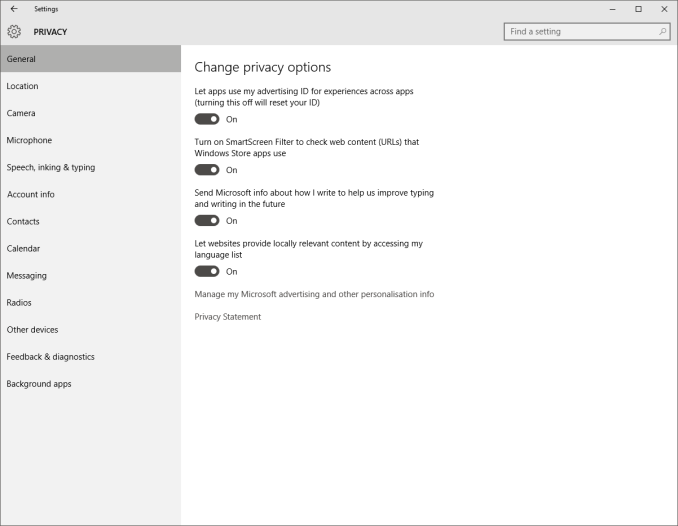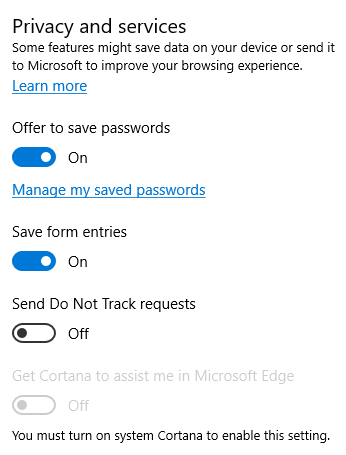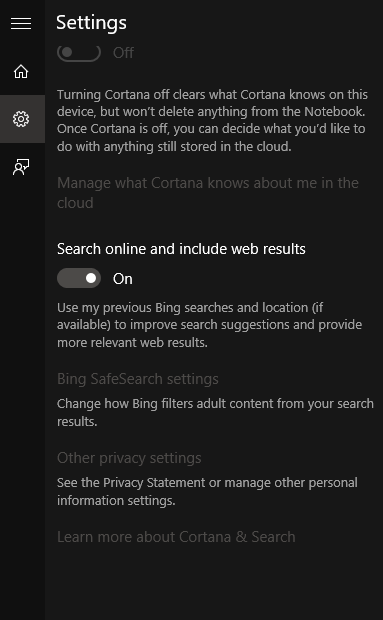The Windows 10 Review: The Old & New Face of Windows
by Brett Howse on August 25, 2015 8:00 AM EST- Posted in
- Operating Systems
- Microsoft
- Windows 10
Windows 10 Privacy
There has been an enormous amount of talk lately about Windows 10’s privacy settings, and what this means for people who use Windows 10. Yes, Windows 10 does do more with your data than any previous version of Windows, but that is not always a bad thing.
Many of the services which are designed to help you are going to require access to your information in order to function. Cortana can’t let you know about an upcoming event if it doesn’t have access to your calendar. The state of the world in 2015 is that in order for these types of services to work, you have to let them have access to your information. Cortana, as an example, does not live in a vacuum, and these same types of features are certainly prevalent on other operating systems too. Google Now is a great example of a service which people have come to really appreciate, and the very things they appreciate are based on the fact that it has a lot of access to your personal information.
Any person that is concerned about what Microsoft is collecting and how they are using it should really start by reading their Privacy Statement and getting an understanding about what is collected and what it is used for. Some of this is obvious, like Microsoft needs to provide access to your information if requested by a court order. Microsoft is not above the law. Some of it is not as obvious though, like what is your advertising ID.
Windows 10 is a free upgrade, but regardless of Windows 10 many of the services which are associated with it are free as well, such as outlook.com. Microsoft is paying for these services with advertising much like many other web services. In order to provide you with more relevant ads, you have an advertising ID associated with your account. Some people may not like this, and the privacy settings to turn this off can be found in Settings under the Privacy header. There are also more settings within Edge which let you enable Do Not Track requests and more.
Edge Privacy Settings
Search Privacy Settings
A lot of the discussion about privacy is how so much of this is on be default, and that is certainly true. If you choose Express Settings during setup, a lot of this is enabled. You can also choose Custom and choose what you want turned on during setup. Other services like Cortana are Opt-In, and will prompt you for consent the first time you try to access it. If you don’t want Cortana to access your information, please turn Cortana off.
For people that would like to read more about the individual features of Windows 10 and their privacy concerns, Microsoft has a Windows 10 Privacy FAQ page which you can take a look at. This goes over all of the features, what they do, and how you can turn them off. I really encourage users that are concerned to read this over.
Let’s be honest here for a minute though. The privacy concerns are certainly not overblown, but for most people, they will make the trade-off of less privacy if it means an improved experience. The textbook example here is advertising, where in order to deliver relevant ads to the user (or rather not serve them useless ads) the ad service must be able to learn something about the user and their preferences. Microsoft is certainly not the first company to do this, and Windows 10 is not even the first version of Windows where this is an issue. Many of these same concerns could be had with Windows 8 as well. But I think services like Cortana that are so proactive can touch a nerve with the privacy conscious and that is 100% fine. If you are concerned, the best thing to do is to read the privacy statement and adjust your settings accordingly.













293 Comments
View All Comments
zman58 - Thursday, October 15, 2015 - link
"worlds largest and most obnoxious spyware"We really don't know exactly what data it sends back on the user and their system(s) do we? The EULA does not detail this for us. In fact, the EULA has you agree to whatever they desire from your system--for improving the product. The spyware option is purely opt-out, for those of us who know what opt-out means and are capable of figuring out how to opt-out.
Then once you can/do opt-out, how can you be assured you will remain opted-out through upgrades, hot-fixes, patches, and what-not?
Bottom line is that the vendor decides what and when they want to collect data from your system, you have absolutely no control over them. Read the EULA and consider what it means before you click "I agree". You might not want to click that button...
Perhaps using an alternative reliable, safe, secure, and private operating system might be a better approach. ...Well hello there Linux.
bs grinder - Tuesday, December 26, 2017 - link
thanxjohn
ddriver - Wednesday, August 26, 2015 - link
"The privacy concerns are certainly not overblown, but for most people, they will make the trade-off of less privacy if it means an improved experience. The textbook example here is advertising, where in order to deliver relevant ads to the user"Ah yeas, I bet the whole world rejoices being able to give up their privacy to be blasted with ads. It is a great trade-off indeed.
"If you are concerned, the best thing to do is to read the privacy statement and adjust your settings accordingly."
I bet that's the best you can do, pretending that somehow clicking a button or two magically makes all problems go away
Also, I see a catch in those "privacy settings". You seem to only be able to turn off "sending MS info", but that doesn't imply that data is still not being mined and sent anywhere else.
imaheadcase - Wednesday, August 26, 2015 - link
You are aware these settings are present in almost almost win OS? The only privacy stuff they collect is related to MS services, onedrive, etc. Just because win 10 gave people options (gasp!) vs win 8 and 7 does not mean those did not, and still do have it.ddriver - Wednesday, August 26, 2015 - link
No they are not. Especially if you bother to watch what updates you install. For example, MS will try to sneak in the "telemetry" data miner service on your windows 7 as an update, but it is not there to begin with.I haven't used and will likely never use a windows version after 7, but in a "clean" windows 7 install none of the win 10 invasions of privacy are present. It doesn't keylog, it doesn't listen to speech, it doesn't analyze text or file content and it doesn't report everything you do back home.
Oh, and you can also chose not to install certain updates, whereas with the "nice free" windows 10 MS get to deploy on your system whatever it wants - all in the name of your comfort.
Michael Bay - Wednesday, August 26, 2015 - link
Your religious belief in 7 is amusing, at least.ddriver - Thursday, August 27, 2015 - link
If anyone around here is a believer, that is you, believing MS are trustworthy that is.Gigaplex - Friday, August 28, 2015 - link
If you don't trust MS, you shouldn't be using any version of Windows.althaz - Thursday, August 27, 2015 - link
FYI: Windows 7 collects telemetry by default. It was turned off by default in Vista and XP, but most OEMs turned it on for you. So Win 10 is collecting the same information as Windows XP, Vista and 7 (and 8), for most people.yuhong - Friday, August 28, 2015 - link
Does Win10 really "keylog" outside of search boxes and the like? search suggestions are not new either. There is no evidence that Win10 can read arbitrary files either.